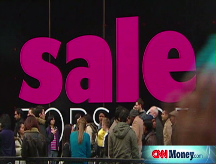U.S. sellers to world: Please buy our leftovers
In an abysmal sales year, anxious retailers are eyeing overseas markets to unclog the buildup of unsold products.
NEW YORK (CNNMoney.com) -- Here's an irony of the recession: U.S. retailers that buy cheap products from China and elsewhere to sell at home are now looking to quickly unload those same items overseas.
As more Americans continue to buy significantly less merchandise, stores are stuck with plenty of unsold product this year.
What's more, a lackluster holiday shopping season will likely exacerbate this situation. Retail analysts estimate that the level of excess inventory this year is up 20% or more over last year.
And the glut of unsold goods building up on store shelves and in warehouses includes everything from coats, sweaters and jewelry to kitchen blenders, flatscreen TVs, alcoholic beverages and cars.
Ideally, this would be great for consumers because when supply vastly outstrips demand, merchants have little choice but to keep slashing prices. Already, many stores have chopped prices 50 to 70% this year.
So maybe if you hold out long enough, you might be able to buy that Christmas gift for as much as 90% off.
Well, not quite, said Richard Hastings, consumer strategist with Global Hunter Securities.
"No matter how difficult the selling environment gets, there are contracts between retailers and suppliers and regulatory laws that prevent merchants from 'dumping' products at any price," Hastings said. "It's not going to be a free-for-all."
Hastings explained that retailers that carry their own proprietary brands - like Old Navy selling "Old Navy"-branded merchandise - can sell the products at any price they choose.
"It can even be a penny," he said. "But if you're selling third-party brands in your store, there are contracts in place that control prices."
That's because suppliers don't want merchants to dump their products into the market at any price since this can erode the value and perception of their brand.
In this environment, Hastings said it's easier for U.S. merchants to get the leftovers out of the continent and into other countries where they are not bound by the same restrictions.
Traditionally, retailers look to secondary channels such as closeout sellers, liquidators and discounters to unclog their inventory pipeline.
This year, the severe slump in consumer spending has impacted sales at those merchants as well and many are unwilling to take on more of retailers' leftovers.
With their back against the wall, many sellers are looking more and more for help outside of the United States.
"Retailers have in the past moved [unsold] goods outside of the U.S.," said John Ende, chief operating officer with Argent Trading a New York-based corporate trading company that specializes in handling retailer's unsold merchandise.
"Many times, that's because they don't want to cannibalize their regular channels like liquidators," he said. "Now, there's an added impetus [to this trend] because there's too much merchandise flooding the domestic market."
In fact, the economic downturn has made it boom time for companies such as Argent Trading.
Ende, who declined to name the company's retail clients due to confidentiality agreements, said his company has been involved in a growing number of deals to sell furniture, clothing and electronics in countries like Israel, Austria, Netherlands, the United Kingdom and Canada.
The cost of these overseas deals tends to be higher for retailers, he explained. If it's a purely cash deal, then a U.S. liquidator would typically pay a wholesale price of 25 cents to the $1 for overstocked goods, Ende said.
But if the goods are being purchased by an foreign liquidator, then retailers often have to pay the shipping costs, he said.
However, at this point, industry experts said most merchants will incur these additional costs instead of sitting on leftovers.
"Retailers went into 2008 with significantly less inventory but they still can't get the sales," said Ted Hurlbut, a retail expert and principal with Hurlbut & Associates.
The implications of this are two-fold, he said. If retailers can't sell their products, they will have to continue to cut prices. "That will hammer margins and profits," Hurlbut said.
"Many products become obsolete after a season," said Hurlbut. "They have to get rid of merchandise in a timely manner. They also need the cash by year-end because they have to pay their suppliers and creditors for next season's merchandise."
New Jersey-based Active International, a large global corporate trading firms, uses a "barter" system to handle its retail clients' unsold extras.
So the company gives "trade credits" instead of "cash" to its customers for their extra inventory. Clients can then use the credits to get discounts from the firm on services like advertising, travel and other business expenses.
Ricard Vendig, chief financial officer with Active International, said his company has also recently brokered deals with international firms to buy inventory from U.S. retailers.
"It's virtually any product. Toys, pogo sticks, food, luxury products, even undergarments. Retailers are trying to dispose of inventory as fast as they can," Vendig said. He also declined to name the company's retail clients, citing confidentiality agreements.
Meanwhile, Vendig said a global slowdown in consumer spending has made it more challenging to find overseas buyers. "It's not just in the U.S. There's softness in regional economies around the world," Vendig said.
Hastings sees another reason for retailers' eagerness to dump their excess inventory overseas.
"The longer [merchants] hold on to inventory, the less the products will be worth," Hastings said. "It's a real mess right now [for retailers]." ![]()


